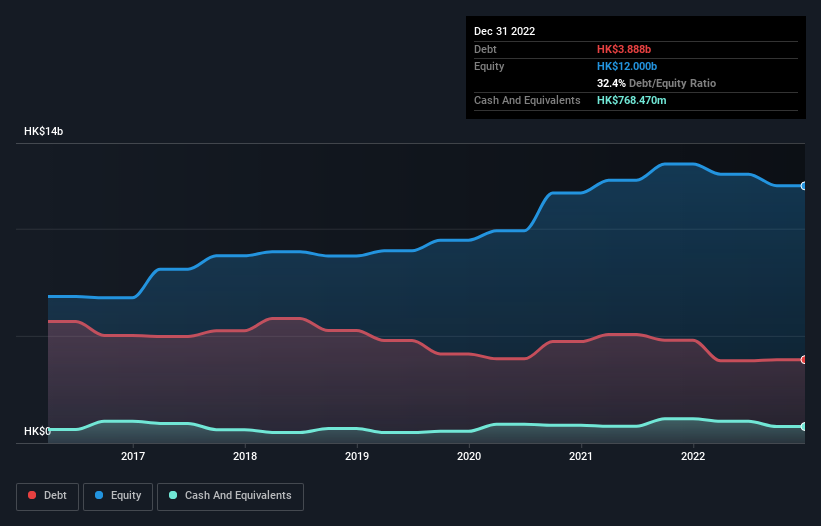- Hong Kong
- /
- Household Products
- /
- SEHK:3331
These 4 Measures Indicate That Vinda International Holdings (HKG:3331) Is Using Debt Extensively

Howard Marks put it nicely when he said that, rather than worrying about share price volatility, 'The possibility of permanent loss is the risk I worry about... and every practical investor I know worries about.' When we think about how risky a company is, we always like to look at its use of debt, since debt overload can lead to ruin. As with many other companies Vinda International Holdings Limited (HKG:3331) makes use of debt. But the real question is whether this debt is making the company risky.
What Risk Does Debt Bring?
Debt and other liabilities become risky for a business when it cannot easily fulfill those obligations, either with free cash flow or by raising capital at an attractive price. In the worst case scenario, a company can go bankrupt if it cannot pay its creditors. However, a more common (but still painful) scenario is that it has to raise new equity capital at a low price, thus permanently diluting shareholders. Of course, the upside of debt is that it often represents cheap capital, especially when it replaces dilution in a company with the ability to reinvest at high rates of return. When we think about a company's use of debt, we first look at cash and debt together.
View our latest analysis for Vinda International Holdings
What Is Vinda International Holdings's Debt?
You can click the graphic below for the historical numbers, but it shows that Vinda International Holdings had HK$3.89b of debt in December 2022, down from HK$4.80b, one year before. However, it does have HK$768.5m in cash offsetting this, leading to net debt of about HK$3.12b.

How Strong Is Vinda International Holdings' Balance Sheet?
The latest balance sheet data shows that Vinda International Holdings had liabilities of HK$8.83b due within a year, and liabilities of HK$3.46b falling due after that. On the other hand, it had cash of HK$768.5m and HK$2.64b worth of receivables due within a year. So it has liabilities totalling HK$8.88b more than its cash and near-term receivables, combined.
While this might seem like a lot, it is not so bad since Vinda International Holdings has a market capitalization of HK$24.3b, and so it could probably strengthen its balance sheet by raising capital if it needed to. But we definitely want to keep our eyes open to indications that its debt is bringing too much risk.
We measure a company's debt load relative to its earnings power by looking at its net debt divided by its earnings before interest, tax, depreciation, and amortization (EBITDA) and by calculating how easily its earnings before interest and tax (EBIT) cover its interest expense (interest cover). This way, we consider both the absolute quantum of the debt, as well as the interest rates paid on it.
Vinda International Holdings's net debt to EBITDA ratio of about 1.6 suggests only moderate use of debt. And its strong interest cover of 11.5 times, makes us even more comfortable. It is just as well that Vinda International Holdings's load is not too heavy, because its EBIT was down 60% over the last year. Falling earnings (if the trend continues) could eventually make even modest debt quite risky. There's no doubt that we learn most about debt from the balance sheet. But ultimately the future profitability of the business will decide if Vinda International Holdings can strengthen its balance sheet over time. So if you want to see what the professionals think, you might find this free report on analyst profit forecasts to be interesting.
Finally, while the tax-man may adore accounting profits, lenders only accept cold hard cash. So we always check how much of that EBIT is translated into free cash flow. In the last three years, Vinda International Holdings's free cash flow amounted to 40% of its EBIT, less than we'd expect. That's not great, when it comes to paying down debt.
Our View
Vinda International Holdings's EBIT growth rate was a real negative on this analysis, although the other factors we considered cast it in a significantly better light. For example its interest cover was refreshing. When we consider all the factors discussed, it seems to us that Vinda International Holdings is taking some risks with its use of debt. While that debt can boost returns, we think the company has enough leverage now. The balance sheet is clearly the area to focus on when you are analysing debt. However, not all investment risk resides within the balance sheet - far from it. We've identified 1 warning sign with Vinda International Holdings , and understanding them should be part of your investment process.
Of course, if you're the type of investor who prefers buying stocks without the burden of debt, then don't hesitate to discover our exclusive list of net cash growth stocks, today.
If you're looking to trade Vinda International Holdings, open an account with the lowest-cost platform trusted by professionals, Interactive Brokers.
With clients in over 200 countries and territories, and access to 160 markets, IBKR lets you trade stocks, options, futures, forex, bonds and funds from a single integrated account.
Enjoy no hidden fees, no account minimums, and FX conversion rates as low as 0.03%, far better than what most brokers offer.
Sponsored ContentNew: Manage All Your Stock Portfolios in One Place
We've created the ultimate portfolio companion for stock investors, and it's free.
• Connect an unlimited number of Portfolios and see your total in one currency
• Be alerted to new Warning Signs or Risks via email or mobile
• Track the Fair Value of your stocks
Have feedback on this article? Concerned about the content? Get in touch with us directly. Alternatively, email editorial-team (at) simplywallst.com.
This article by Simply Wall St is general in nature. We provide commentary based on historical data and analyst forecasts only using an unbiased methodology and our articles are not intended to be financial advice. It does not constitute a recommendation to buy or sell any stock, and does not take account of your objectives, or your financial situation. We aim to bring you long-term focused analysis driven by fundamental data. Note that our analysis may not factor in the latest price-sensitive company announcements or qualitative material. Simply Wall St has no position in any stocks mentioned.
About SEHK:3331
Vinda International Holdings
Vinda International Holdings Limited, an investment holding company, manufactures and sells household paper and personal care products in Mainland China, Hong Kong, Malaysia, Japan, Taiwan, and internationally.
Flawless balance sheet with moderate growth potential.
Market Insights
Community Narratives




